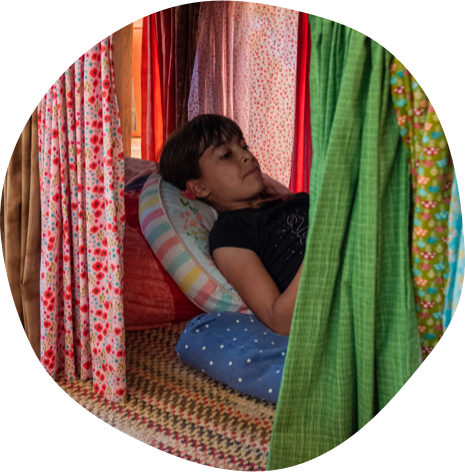

Why Are Reading Places Important?
“We spend countless hours thinking about what we are reading (or what we want to read) but not nearly as much time thinking about where we read. The truth is, where we read matters.”
— Steacy Pinney, reading place designer
Reading Places and Placemaking


Reading Places create unique placemaking opportunities in our homes, businesses, communities, and schools. Placemaking is the process of creating spaces that inspire people to explore and gather. They encourage individuals to experience new activities, meet new people, and ultimately, forge a deeper connection with the space itself.
Great reading places do just that – they use placemaking to connect their readers with the space, other readers, and most importantly, to the stories they are reading. When we build and enhance reading places, we also enhance the experience of the readers themselves, may they be in the home, or in the community.
“Adults admire their environment. They remember and think about it, but the child absorbs it. The thing the child sees are not just remembered. They form part of the child’s soul.”
-Dr. Maria Montessori
Reading Places at Home


For Children
Reading expands young minds by introducing new words into their vocabulary and providing an understanding of both what those words mean and how they shape the world around us.
Giving children information about books and a choice to pick what they read helps teach self control and independent thought in the choices they make.
Studies have shown that both the acts of reading and being read to at home contributes to positive behaviours in children. When children read regularly at home, they gain appreciation for books and learn that reading is a valuable and fun activity.


For Families
Reading–either as a family or individually fosters positive relationships between parents, children and siblings. Research shows that when adults act as reading role models by demonstrating the value of reading, it sparks childrens’ curiosity and excitement about books and reading.
Reading books helps children understand the world around them and understand people and places they might not encounter in their daily lives.
“The catalyst that conveys any physical location—any environment, if you will—into a place is the process of experiencing deeply. A place of the whole environment that has been claimed by feelings…We are homesick for places.”
-Alan Gussow, A Sense of Place
Reading Places in the Community


For Societies
Reading helps our social fabric by opening us up to new ideas and ways of thinking that may differ from our own, expanding our understanding of the human experience.
By learning the story of others, reading helps us understand people from different backgrounds. Empathizing with people different from ourselves can contribute to a more compassionate society.
Isolation is increasing and volunteerism is declining. Places like community reading places bring people together and can help people learn and connect in a safe, supportive and welcoming environment.


For Democracies
Reading is important to a healthy democratic society. It helps build shared knowledge about the world and empowers us to question and build our own perspectives on important issues.
Reading helps us understand different perspectives on the world. Community reading places can create spaces for dialogue about the challenges we face and how we might to address them.


Economies
A 1% rise in literacy rates would ultimately lead to a 3% rise in GDP, or $54 billion per year, every year, and a 5% increase in productivity. (Wiederhold and Schwerdt, 2018)
As the global economy shifts and presents new challenges, continuous learning ensures that individuals can adapt and remain competitive. Reading and literacy is foundational to lifelong learning and opening up new opportunities.


Innovation
Twice a year, Bill Gates would take a ‘Think Week’ where he would dedicate himself to reading about new ideas, which would lead to new innovations at Microsoft.
Reading is a virtuous cycle. The act exposes the reader to different perspectives, which in turn can lead to the creation of new ideas. Reading places can serve as an ‘idea accelerator’ where people can discuss and explore new ideas.
Reading spaces at home
Grab a couple crayons or markers, your favorite books, a light and a basket, and let’s make a reading place! Fill this workbook with your craziest ideas and designs, and use it as inspiration for building your very own reading place at home!
Books to inspire a love of reading
Peruse our thoughtfully curated list of children’s books categorized by themes such as kindness and ‘I’m me.’